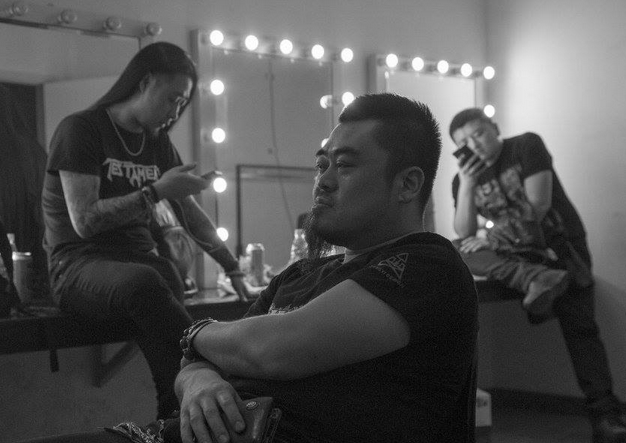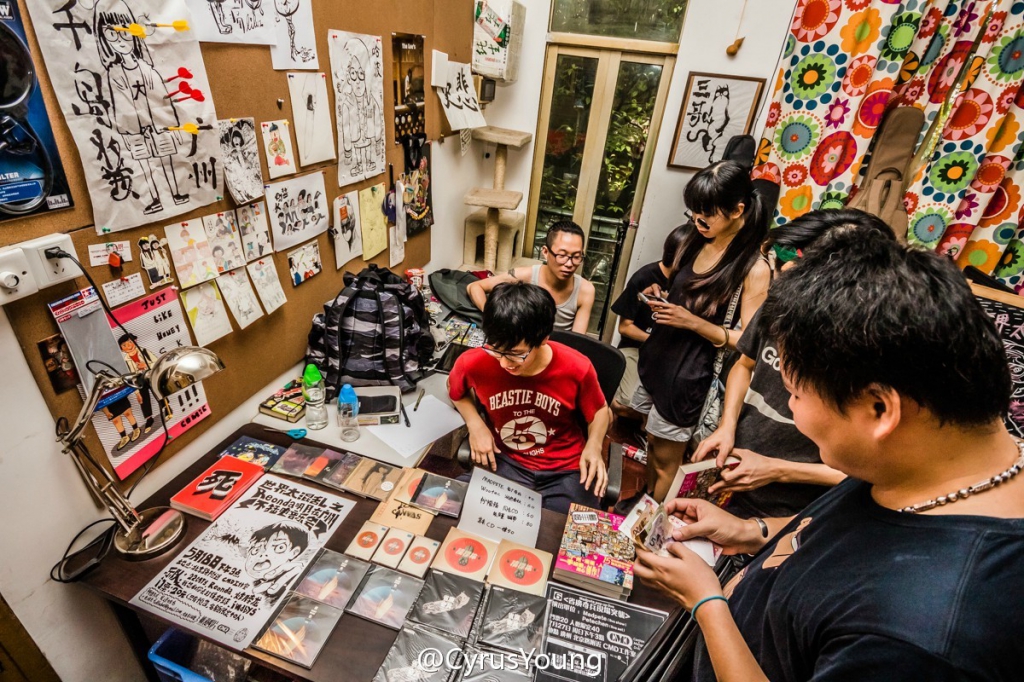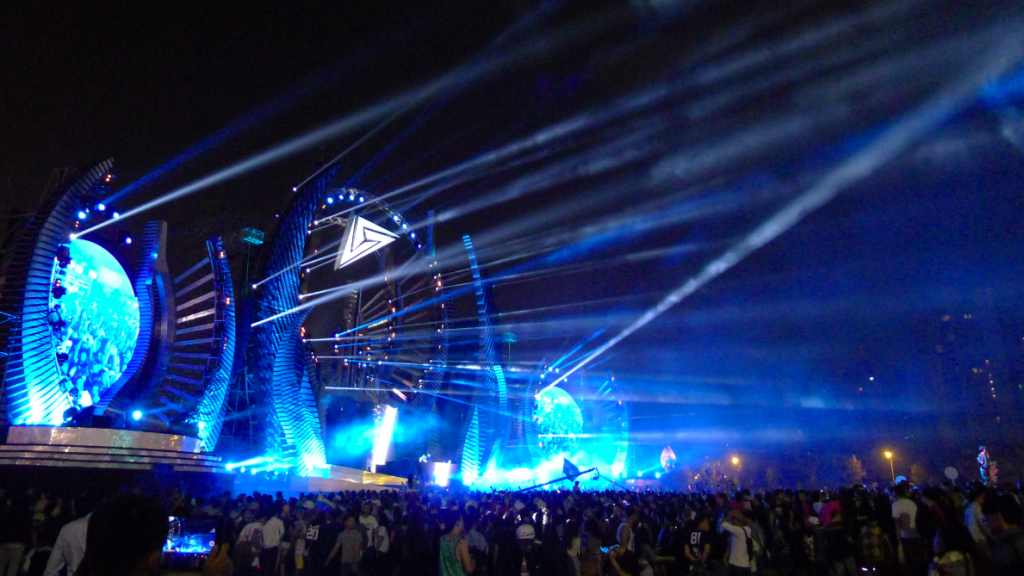It’s been an eventful 12 months in the Chinese music industry, with significant shakeups at every level.
Horizons shrank, ecosystems expanded, and a thousand buzzwords bloomed.
We’ve distilled the year’s news into three trends, along with some analysis on what to expect in the coming year.
I. Draconian oversight permeated the music business
What happened:
Alternative music became political without any politics.
There were several high-profile cancellations this year, most to do with permits and ‘controversial’ actions made by the artist in question. Robbie Williams and Maroon 5 were red-flagged earlier in the year, as was Jon Bon Jovi, despite his heartstring-tearing attempt to pander to Chinese fans.
Some indie bands moved into the mainstream with ease (folk group Hanggai won Season 2 of the popular TV show “Sing My Song” in March) while others faced the censors. Miserable Faith and Shuh Tou, recommended by Cui Jian to play on ‘The Grammy Star of China’ (中国之星) saw their live sets drastically cut.
Several local music festivals were cancelled (mostly in Beijing), and the rhetoric around alternative music as ‘western propaganda’ intensified after remarks to that effect from President Xi Jinping. In August 2015, the Ministry of Culture blacklisted 120 songs off online streaming sites for “vulgarity”, the bulk of them tunes from local hip-hop groups like Yin San’er. Even bands that were granted permits, such as metal overlords Megadeth, had to play a farcical set with half their ‘controversial’ songs as instrumentals.
Analysis:
But it’s trite to merely dismiss this as misinformed and retrograde. Let’s be clear: IT IS, but at the heart of this is a series of complex issues that the music industry needs to address and help untangle. There is, for instance, the continued belief in policy circles that the alternative music industry is little more than drugs and propaganda – just nihilistic wasted youth going down morally dubious paths. See, for instance, the punitive prohibition handed down to the MIDI Music School in Beijing.
There are important questions here to think about for 2016 and the years ahead: how are music business dealing with policymakers and governmental bodies? How can we shift the discourse to see Chinese alternative music as a valuable source of, say, soft power?
Speaking of power, all these moves also signal that music is now important. It’s role in crafting the ‘Chinese Dream’ crucial. From January 2016, Internet Streaming sites have been asked to remove objectionable content from their catalogues. Cultural policing of music, all music, became a reality in 2015 – and this fundamentally impacts every layer of the music business.
Impacts:
These top-level moves produce two levels of impact – there is the effect on what you might call the ‘entrepreneurial’ side and the impact on local ecosystems.
Entrepreneurial Impacts:
More government oversight means greater risks for entrepreneurs with ideas, and a colder atmosphere for innovation, specifically at the lower end. When the 330 Metal Festival was cancelled abruptly in Beijing, promoters (among them dedicated fans of local metal music) lost close to 13,000 USD. This will no doubt produce a chilling effect on the creative side of this industry.
Local ecosystems:
Here, we have to talk about Beijing. With numerous festivals cancelled, a burgeoning bureaucratic load to organize even the easiest of shows, and the (forced or otherwise) shutdown of mid-size music venues meant that Beijing’s position as a wider conduit for local bands was severely challenged in 2015.
While the experimental and punk scene is still thriving, it’s become a harder city to hook an industry on. There is now a thick glass ceiling for bands with wider ambitions, with many of them switching focus completely to the US and Europe, having ‘saturated’ the local market. This is a shame, because there is still an audience here to build.
But there are some exciting new moves in building that audience. This is our second big trend of the year. The rise of the label.
II. The Rise of the Labels
There were the big ones: Douban’s D-Force, Xiami, Vice. There were the tastemakers: Fake Music in Beijing, Groove Bunny Records in Jinhua, Subkvlt in Shanghai. And there were the many, many niche operations all over the country.
Labels dominated the alternative music landscape this year, propelling some acts (Modern Sky’s heavy hitters prominent among them) into what you might call the upper-tier of indie fame. To be fair, this is still a tiny slice of the pie, but 2015 saw the consolidation of this indie upper crust, driven by labels.
The question for 2016 is this: will the labels start becoming profitable, sustainable entities?
At the moment, most are either brand-supported promotion vehicles, hobbyist pursuits, investor backed startups or community-driven projects. Money is only one of the motivations, and that’s part of what makes the label scene relevant.
But like the indie upper-crust they’re helping establish, it’s valuable for the industry to have an upper-crust of labels too. The defining indie tastemakers of the country. Bands need them to get music to a wider audience, and there’s a wider industry connection here that leads into our third trend.
Consider the labels as a small circle in a Venn Diagram, dominated by the lurching behemoth that is Tech Money chasing platforms and content. These are the Baidus, Alibabas and Tencents, lurching Death Star-like, towards the carefully curated, exciting content that labels produce and they will eventually need.
III. A Looming Music Bubble?
If there’s one thing 2015 made clear, there’s a lot of money swimming around in music in China.
What happened:
- Big money is pouring in from the tech giants. Apple Music enters the China market. Tencent signs deals with the majors, and the establishment of Alibaba Music leads to a veritable ‘copyright war’, with suits and countersuits sprouting up everywhere. Yinyuetai inks a deal with Billboard to establish the definitive Chinese charts, and LeTV is selling cheap high-definition TVs with music content plans bundled.
- A directive from China’s National Copyright Administration asking all online music services to stop offering unauthorized music by October 31 sent said services into a flurry of deletions and take-downs.
- Big brands are getting into the act too. The Budweiser Storm Festival rose to become one of China’s biggest festivals, relentlessly pushing its EDM game. Olive Oil became the next disruptive force in music. But brand collaborations appear to be losing energy – rehashing old ideas, or recycling tired tropes.
- Modern Sky Entertainment made some curious investments, including a puzzling one in Liverpool Sound City.
Analysis:
- Most big-ticket investments in music today appear to be speculative. The current gold rush is to either sell subscriptions by offering the largest catalogue (Baidu, QQ Music, Alibaba) or to sell hardware (LeTV).
- Grim as the short-term outlook may be for online streaming services (expect consolidation, similar to the shakeup that saw Rdio shuttering, and being acquired by Pandora), these ‘copyright wars’ are necessary as China integrates further with a global music market. Underscoring this is also the realization that content will determine everything – see Trend 2.
- A volatile short-term outlook combined with speculative investments that don’t really show the revenue has the makings of a music bubble.
Impacts:
There are three key questions to be asked here, all of which will dictate the outlook for 2016:
- Is this market going to work on an investment model, or can the tech giants get a solid consumer-based sales model working?
- As content investments intensify in 2016, speculative investments will have to give way to strategic investments. Companies and brands will need to eventually show revenue.
- Unique content forms will be necessary to capture listener interest and sustain engagement – brands will have to get creative in order to add value and make an impact.
So, TL;DR:
the bands will get bigger, the labels more important. Draconian oversight will produce a chilling effect, but not enough to stop the juggernaut of tech and brand money overtaking the upper-end of the business. Some of these speculative investments will go sour, and 2016 will likely be a year of consolidation and further shakeups.
But the music will continue, as always.
Happy new year to all our readers, and let us know what you think in the comments below.



